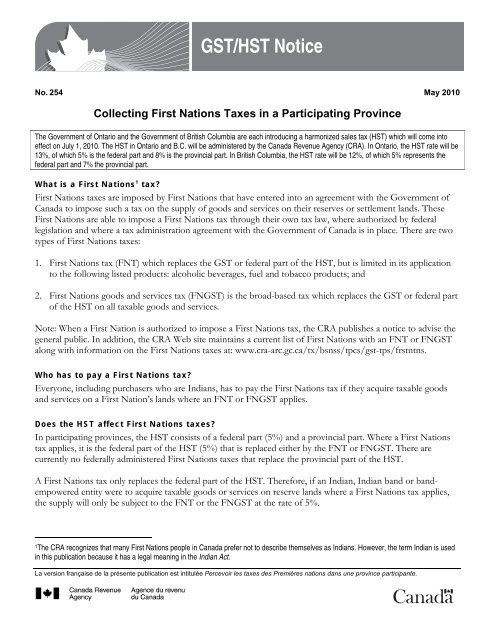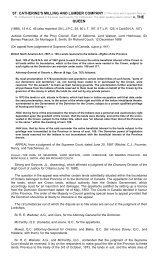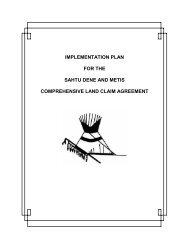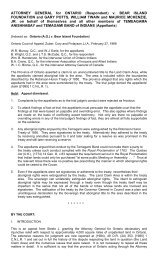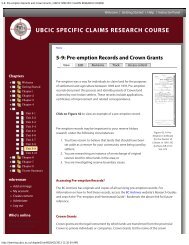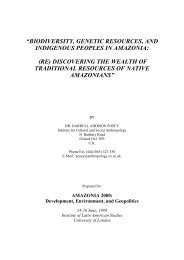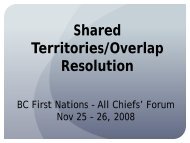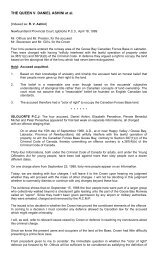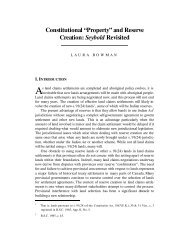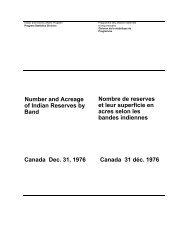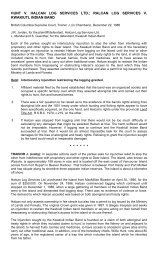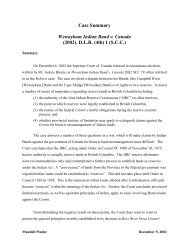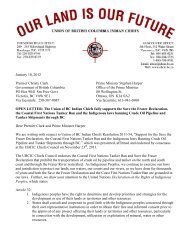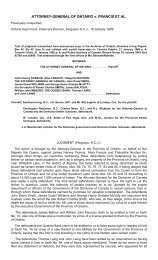GST/HST Notice - Union of British Columbia Indian Chiefs
GST/HST Notice - Union of British Columbia Indian Chiefs
GST/HST Notice - Union of British Columbia Indian Chiefs
Create successful ePaper yourself
Turn your PDF publications into a flip-book with our unique Google optimized e-Paper software.
<strong>GST</strong>/<strong>HST</strong> <strong>Notice</strong>No. 254 May 2010Collecting First Nations Taxes in a Participating ProvinceThe Government <strong>of</strong> Ontario and the Government <strong>of</strong> <strong>British</strong> <strong>Columbia</strong> are each introducing a harmonized sales tax (<strong>HST</strong>) which will come intoeffect on July 1, 2010. The <strong>HST</strong> in Ontario and B.C. will be administered by the Canada Revenue Agency (CRA). In Ontario, the <strong>HST</strong> rate will be13%, <strong>of</strong> which 5% is the federal part and 8% is the provincial part. In <strong>British</strong> <strong>Columbia</strong>, the <strong>HST</strong> rate will be 12%, <strong>of</strong> which 5% represents thefederal part and 7% the provincial part.What is a First Nations 1 tax?First Nations taxes are imposed by First Nations that have entered into an agreement with the Government <strong>of</strong>Canada to impose such a tax on the supply <strong>of</strong> goods and services on their reserves or settlement lands. TheseFirst Nations are able to impose a First Nations tax through their own tax law, where authorized by federallegislation and where a tax administration agreement with the Government <strong>of</strong> Canada is in place. There are twotypes <strong>of</strong> First Nations taxes:1. First Nations tax (FNT) which replaces the <strong>GST</strong> or federal part <strong>of</strong> the <strong>HST</strong>, but is limited in its applicationto the following listed products: alcoholic beverages, fuel and tobacco products; and2. First Nations goods and services tax (FN<strong>GST</strong>) is the broad-based tax which replaces the <strong>GST</strong> or federal part<strong>of</strong> the <strong>HST</strong> on all taxable goods and services.Note: When a First Nation is authorized to impose a First Nations tax, the CRA publishes a notice to advise thegeneral public. In addition, the CRA Web site maintains a current list <strong>of</strong> First Nations with an FNT or FN<strong>GST</strong>along with information on the First Nations taxes at: www.cra-arc.gc.ca/tx/bsnss/tpcs/gst-tps/frstntns.Who has to pay a First Nations tax?Everyone, including purchasers who are <strong>Indian</strong>s, has to pay the First Nations tax if they acquire taxable goodsand services on a First Nation’s lands where an FNT or FN<strong>GST</strong> applies.Does the <strong>HST</strong> affect First Nations taxes?In participating provinces, the <strong>HST</strong> consists <strong>of</strong> a federal part (5%) and a provincial part. Where a First Nationstax applies, it is the federal part <strong>of</strong> the <strong>HST</strong> (5%) that is replaced either by the FNT or FN<strong>GST</strong>. There arecurrently no federally administered First Nations taxes that replace the provincial part <strong>of</strong> the <strong>HST</strong>.A First Nations tax only replaces the federal part <strong>of</strong> the <strong>HST</strong>. Therefore, if an <strong>Indian</strong>, <strong>Indian</strong> band or bandempoweredentity were to acquire taxable goods or services on reserve lands where a First Nations tax applies,the supply will only be subject to the FNT or the FN<strong>GST</strong> at the rate <strong>of</strong> 5%.1 The CRA recognizes that many First Nations people in Canada prefer not to describe themselves as <strong>Indian</strong>s. However, the term <strong>Indian</strong> is usedin this publication because it has a legal meaning in the <strong>Indian</strong> Act.La version française de la présente publication est intitulée Percevoir les taxes des Premières nations dans une province participante.
Provided the purchaser meets the criteria set out in Technical Information Bulletin (TIB) B-039, <strong>GST</strong>/<strong>HST</strong>Administrative Policy - Application <strong>of</strong> the <strong>GST</strong>/<strong>HST</strong> to <strong>Indian</strong>s, the provincial part <strong>of</strong> the <strong>HST</strong> will be relieved.To assist vendors in determining if a supply made in <strong>British</strong> <strong>Columbia</strong> to an <strong>Indian</strong> is taxable, partially taxable, orfully relieved, please see the attached chart. This chart provides examples for First Nations in <strong>British</strong> <strong>Columbia</strong>only, as there are no affected First Nations in Ontario.Example 1 – FNT is collectedAn <strong>Indian</strong> individual purchases a package <strong>of</strong> cigarettes and a magazine from a convenience store on a reserve with an FNT in <strong>British</strong> <strong>Columbia</strong>.The individual presents their certificate <strong>of</strong> <strong>Indian</strong> status card 2 , at the time <strong>of</strong> payment for the purchases. The individual will be required to pay theFNT (5%) on the cigarettes. Just the provincial part <strong>of</strong> the <strong>HST</strong> (7%) on the cigarettes and the <strong>HST</strong> (12%) on the magazine will be relieved underTIB B-039.Example 2 – FN<strong>GST</strong> and the provincial part <strong>of</strong> the <strong>HST</strong> are collectedA Nisga’a citizen wishes to attend a B.C. Elders gathering being held at a resort located on the St. Mary’s reserve in <strong>British</strong> <strong>Columbia</strong>. The StMary’s First Nation has imposed an FN<strong>GST</strong>. The registration fee for the gathering includes a 12% tax composed <strong>of</strong> the FN<strong>GST</strong> (5%) and theprovincial part <strong>of</strong> the <strong>HST</strong> (7%). As tax relief under section 87 <strong>of</strong> the <strong>Indian</strong> Act no longer applies to the Nisga’a Nation and its citizens, they arerequired to pay the provincial part <strong>of</strong> the <strong>HST</strong> in addition to the FN<strong>GST</strong>.Example 3 – <strong>HST</strong> is fully relievedA Tsawwassen First Nation member purchases a new s<strong>of</strong>a from a store in Delta, <strong>British</strong> <strong>Columbia</strong>. The individual presents their INAC issued<strong>Indian</strong> status card at the time <strong>of</strong> payment for the purchase. The store agrees to arrange delivery <strong>of</strong> the s<strong>of</strong>a to the Tsawwassen member’sresidence on Tsawwassen lands that were formerly reserve lands under the <strong>Indian</strong> Act. The purchase <strong>of</strong> the s<strong>of</strong>a is fully relieved <strong>of</strong> <strong>HST</strong> as theprovisions <strong>of</strong> TIB B-039 have been met. Although the Tsawwassen are now a self-governing First Nation, members who are <strong>Indian</strong>s are stillentitled to a transitional eight-year period <strong>of</strong> tax relief until April 30, 2017.For more information regarding First Nations and their citizens who are required to pay the <strong>GST</strong>/<strong>HST</strong> pleaserefer to <strong>GST</strong>/<strong>HST</strong> <strong>Notice</strong> 238, First Nations Having a Self-Government Agreement Ending <strong>Indian</strong> Act Tax Relief –Determining Tax Relief for <strong>Indian</strong> Members Who Are Not Citizens.Informing your customersYou need to let your customers know if tax is being applied to their purchases. You can use cash registerreceipts, invoices, or contracts to inform your customers or you can post signs at your place <strong>of</strong> business. There isno need to change your cash registers or invoicing systems to show the FN<strong>GST</strong> separately from the <strong>GST</strong>/<strong>HST</strong>.You also need to provide specific information to your customers who are registrants claiming input tax credits.See Guide RC4022, General Information for <strong>GST</strong>/<strong>HST</strong> Registrants, for more detailed information about informingyour customers.Enquiries by telephoneTechnical enquiries on the <strong>GST</strong>/<strong>HST</strong>: 1-800-959-8287General enquiries on the <strong>GST</strong>/<strong>HST</strong>: 1-800-959-5525 (Business Enquiries)If you are located in Quebec: 1-800-567-4692 (Revenu Québec)All technical publications on <strong>GST</strong>/<strong>HST</strong> are available on the CRA Web site at www.cra.gc.ca/gsthsttech.2 The CRA will accept as pro<strong>of</strong> <strong>of</strong> registration under the <strong>Indian</strong> Act the Certificate <strong>of</strong> <strong>Indian</strong> Status card issued by <strong>Indian</strong> and Northern AffairsCanada (INAC). Vendors should make a notation on the invoice or other sales document <strong>of</strong> the registry number or the band name and familynumber.
Application Chart <strong>of</strong> <strong>HST</strong> – First Nations in <strong>British</strong> <strong>Columbia</strong> (Effective July 1, 2010)Place <strong>of</strong> acquisition:Where taxable goods are purchased or delivered by a vendor or vendor’s agentWhere taxable services are performed in their entiretyTaxable goods and services providedto:<strong>Indian</strong>s on presentation <strong>of</strong> a Certificate<strong>of</strong> <strong>Indian</strong> Status Card 5Reserves 1 under the <strong>Indian</strong> Act(no FNT 2 - no FN<strong>GST</strong> 3 )Reserves <strong>of</strong> <strong>Indian</strong>Act band with FNTor FN<strong>GST</strong>Tax relieved 6 5% FNT 7 /FN<strong>GST</strong> 12% <strong>HST</strong> 8Rest <strong>of</strong> B.C.(any place that is notan <strong>Indian</strong> reserve 4 )Citizens <strong>of</strong> a self-governing FirstNation that no longer have tax relief 912% <strong>HST</strong> 12% <strong>HST</strong> 10 12 % <strong>HST</strong> 111In the case <strong>of</strong> the Tsawwassen First Nation, the First Nation itself and its government bodies are subject to <strong>GST</strong>/<strong>HST</strong> on or <strong>of</strong>f Tsawwassen lands. However, Tsawwassen<strong>Indian</strong> members are still entitled to a transitory 8-year period <strong>of</strong> tax relief until April 30, 2017, and Tsawwassen lands that were formerly reserve lands are treated as reservelands for purposes <strong>of</strong> tax relief under the <strong>Indian</strong> Act for the same 8-year period.2The First Nations tax (FNT) replaces the <strong>GST</strong> or the federal part <strong>of</strong> the <strong>HST</strong> for only three listed products: alcoholic beverages, fuel and tobacco products. Please note thaton the Sliammon First Nation reserve, the FNT applies only to fuel and tobacco products.3The First Nations goods and services tax (FN<strong>GST</strong>) replaces the <strong>GST</strong> or the federal part <strong>of</strong> the <strong>HST</strong> on reserves <strong>of</strong> First Nations that have a Tax Administration Agreementwith the Government <strong>of</strong> Canada.4Includes settlement land <strong>of</strong> a self-governing First Nation, as this land is no longer reserve land.5Includes <strong>Indian</strong> members that retained tax relief as they opted not to become citizens and beneficiaries <strong>of</strong> the self-governing First Nation that no longer has tax relief. Alsoincludes all Tsawwassen <strong>Indian</strong> members still entitled to tax relief until April 30, 2017.6Technical Information Bulletin B-039, <strong>GST</strong>/<strong>HST</strong> Administrative Policy - Application <strong>of</strong> the <strong>GST</strong>/<strong>HST</strong> to <strong>Indian</strong>s provides more information on the requirements for tax relief toapply.7Applies only to alcoholic beverages, fuel and tobacco products (or on the Sliammon First Nation reserve, to fuel and tobacco products only). All other goods and servicesrelieved if conditions <strong>of</strong> TIB B-039, <strong>GST</strong>/<strong>HST</strong> Administrative Policy - Application <strong>of</strong> the <strong>GST</strong>/<strong>HST</strong> to <strong>Indian</strong>s , are met.8If the lands belong to a self-governing First Nation with an FN<strong>GST</strong>, the <strong>HST</strong> consists <strong>of</strong> the 5% FN<strong>GST</strong> and the 7% provincial part <strong>of</strong> the <strong>HST</strong> (e.g. Nisga’a lands).9E.g., Nisga’a Nation (See <strong>GST</strong>/<strong>HST</strong> <strong>Notice</strong>238, First Nations Having a Self-Government Agreement Ending <strong>Indian</strong> Act Tax Relief - Determining Tax Relief for <strong>Indian</strong> MembersWho Are Not Citizens ).10The <strong>HST</strong> consists <strong>of</strong> 5% FNT/FN<strong>GST</strong> and the 7% provincial part <strong>of</strong> the <strong>HST</strong>.11If the lands belong to a self-governing First Nation with an FN<strong>GST</strong>, the <strong>HST</strong> consists <strong>of</strong> the 5% FN<strong>GST</strong> and the 7% provincial part <strong>of</strong> the <strong>HST</strong> (e.g. Nisga’a lands).


